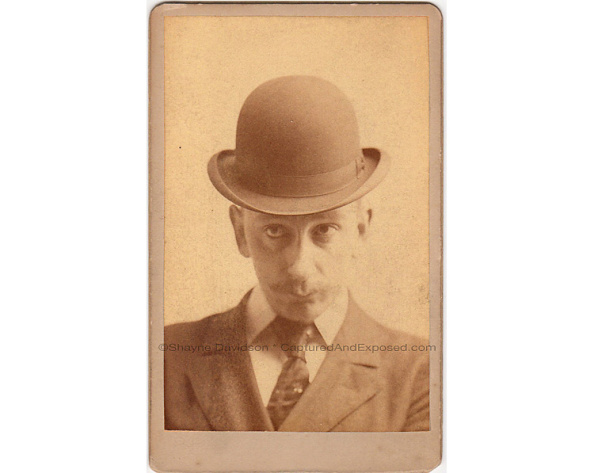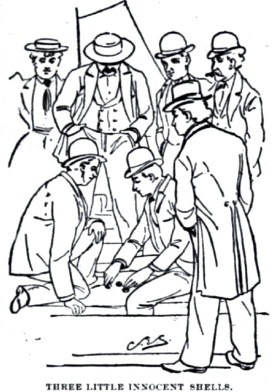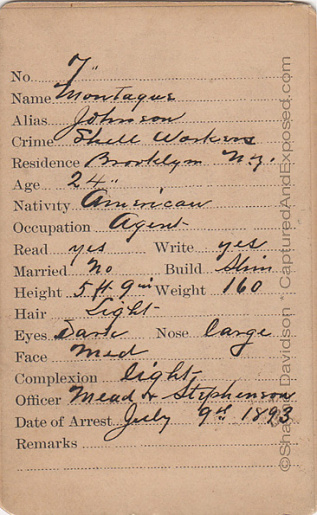
Leon Kentish alias H. Wilson and Harry Montague alias R.F. Johnson were arrested yesterday by Chief of Police Little, Sergeant Kennedy and Officer Neagle. The men were stopping at the Causer House. They are charged with suspicion of larceny, and common gamblers. They are alleged to be shell workers, and travel under the pretense of selling an article for cleaning clothing. The fellows are the same ones who were recently arrested in Binghamton, and taken to Penn Yan, where they were wanted for skipping board bills. The police found the shells upon their persons.
— Star-Gazette, Elmira, New York, July 17, 1893
The shell game is a con as old as time. A pea or small ball is placed under one of three shells (walnut shells were popular) that were laid out, usually on the ground. The shell operator shuffles them around and asks the mark to guess which shell the pea is under. It looks like easy money, but unbeknownst to the mark, the operator, using sleight of hand, has removed the pea before the mark makes his — inevitably wrong — choice. Then the operator surreptitiously places the pea under another shell. He reveals the pea and voila, the mark loses the bet!
Often shills or cappers were used to help convince the mark to get involved in the game or to suggest under which shell the pea would be found. Sometimes the mark was allowed to win once or twice, with the stakes being ratcheted up with each play. Then the operator went in for the kill.
Oily-tongued, nimble-fingered shell workers were said to be “in their glory when they find a man who is out for a good time with a good-sized purse.” They were the bane of the nineteenth century cop’s existence.
“Step right up, gentlemen, and be convinced that the hand is quicker than the eye.” This is the way that the shell-worker opened his game while sitting astride one of the long timbers on the pier. One of the cappers came up and called the turn for $120, which was paid to him without a murmur. Then another one of the party won and induced his friend, a young fellow who looked like he might be a divinity student to try his luck. The shells were thrown and the capper whispered: “Bet him $25 and take the shell on this end.”
— The Inter Ocean, Chicago, June 12, 1894
Needless to say, the divinity student lost his stake. The shell game workers ran off when they noticed a sketch artist sitting nearby, watching them closely and “copping off their mugs” for the newspaper.

 In addition to working the shell game, Harry Montague was wanted by the Newark Police for highway robbery and burglary. When he went before a New York City judge, in June 1893, he literally talked himself into jail by using language so foul that the judge held him in contempt of court. The police planned to hand him over to the New Jersey authorities once he finished serving 29 days in Brooklyn’s Raymond Street Jail.
In addition to working the shell game, Harry Montague was wanted by the Newark Police for highway robbery and burglary. When he went before a New York City judge, in June 1893, he literally talked himself into jail by using language so foul that the judge held him in contempt of court. The police planned to hand him over to the New Jersey authorities once he finished serving 29 days in Brooklyn’s Raymond Street Jail.
Instead Harry managed to elude the New Jersey authorities and make his way upstate. The shells he was carrying tipped off the Elmira police to his real profession and he and his pal, Leon Kentish, were arrested. After that Harry either earned himself a long prison stretch or he changed his alias because his name disappeared completely from police notes in the news.
Featured photo: CDV mugshot of Harry Montague, alias Johnson, July 9, 1893. Collection of the author.
Share this:- More





